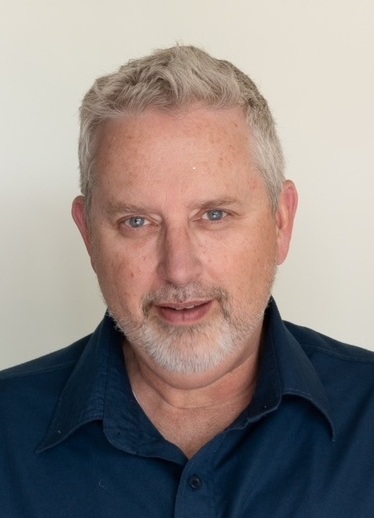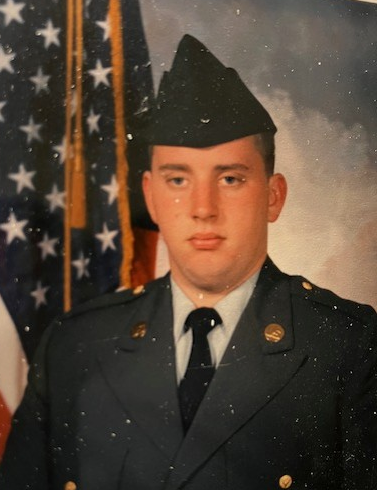
BRYAN WEMPEN - "Keep Going"
Bryan Wempen (Former NE Army National Guard, E-2) – “Keep Going”

“That’s what I write in my books when I autograph them – ‘Keep Going’. It means a lot to me, and I know it’s important to the person buying my book,” said Bryan Wempen, former Army National Guards in Nebraska and a recovering alcoholic who shares his journey of addiction recovery.
Bryan started drinking when he was 14 and blacked out the first night. He’d managed to hide it from family, friends, teachers, and even the military for quite a long time.
Now, with 14 years of recovery, three published books, and a host of other recovery outreach under his belt, he keeps going and encourages others who have walked a similar path to do the same. He taught himself to become a writer so he could share his message about recovery. He and his wife live in Santa Fe, and he is a member of the DPNM Veterans and Military Families Caucus (VMFC).

EARLY LIFE: Bryan was born in California and felt it important to explain that both he and his sister were adopted by parents in Wyoming. “My mother was very adamant that my sister and I knew we were adopted,” he said. “We always have had a very open conversation about it.” This was an early example of his many experiences that have encouraged him to be open and honest. When he was 5, they moved to Nebraska. “Growing up on a cattle farm, I knew all the farm stuff. You spend a lot of time by yourself. I was not a writer growing up, but I had a good imagination,” he explained. “I was very good at football and baseball. I was better at football, but I loved baseball more; I played for nine years, until I was 16,” Bryan said.
“When I started drinking, I knew neither of my parents had a drinking problem. Once I had access to it, it was immediate that that was the thing I wanted to do most. Luckily, I was blessed with a decent logical mind, so school was easy, and I could get away with not doing a lot of work and stayed hidden in the middle. Being an athlete also kept me in check,” he recalled. He graduated from high school a semester early in 1987.
MILITARY LIFE: Bryan’s dad, who passed away in 2014, was a Vietnam Era Army veteran (1966-68) and received the Purple Heart. He was happy to add that his stepdaughter is currently serving as an officer in the Space Force.
He enlisted when he was just 17 and joined the Nebraska Army National Guard right after graduation. Basic training and AIT were at Fort Knox, KY. “I was the youngest one in the company and in the battalion.

My MOS was 19 Echo in a tanker armor combat unit,” Bryan said. He served at the same time VMFC advocacy chair Dorothy Seaton served in the Guard; she was editing the State of Nebraska National Guard Magazine. They met in Santa Fe, where each now lives.
“Our unit won lots of awards,” Bryan explained. “It was a tumultuous time for me. Luckily, I got an honorable discharge when I left in 1991. I was 22. (He was on Individual Ready Reserve status after discharge.) I had a good record, and I was good at my job, but drinking and substance use was a big part of why I bounced around; I got as high as an E4.”
Bryan recalled some valuable life lessons he learned when he was in the Guard:
- “Going in so young, I had a desire to do something different, be in a different place. That gave me a different version of maturity!
- I learned quickly that success is not about the individual – it’s about the group. The sacrifice of individualism for the bigger effort has always stuck with me. That’s a revelation I remember thinking in basic training.
- How I make the bed, how I put my clothes away, etc. – what I do now is similar. These weird little idiosyncrasies!
- I’m a quick study with things and I quickly realized I could cause more problems if I didn’t shape up when I was in the Guard, so I did.”
CIVILIAN LIFE: He attended Kearney State College and worked while he was in the Guard and later transferred to the University of Nebraska-Kearney. He graduated in 5-1/2 years. He continued working after graduating and got into Human Resources recruiting, eventually moving over to the tech (computer) side. He owned a few small software firms and migrated into the tech side of health care. He provided technical support to behavioral health hospitals and clinics in Missouri and in the Western US. One of his clients, the NM Behavioral Health Institute in Las Vegas, NM, was responsible for Bryan falling in love with New Mexico. After several visits and vacations here, he and his wife moved here in 2020. Now he is ready to start a new company focused on integrated technology, cyber, and data privacy risk management at the city, county, state, and federal levels, as well as community health and mental health organizations.
All this time, Bryan continued to drink alcohol; but he decided to stop in 2010. He had no life-changing experience. He just knew he had to stop. “I got to the point where I had enough of how I was feeling and how life was going, and decided I was going to give recovery a go. I just knew that it was going to get way more significantly worse if I didn’t do something at that point,” Bryan admitted. “I was traveling for business. I was in a dark, miserable place. It had been in the back of my mind for a while but hadn’t gotten to that point. I contacted a former business partner who’d been in recovery for a long time. He helped me get started. He gave me a view of life in recovery. So, I tried it.” He’s been sober and in recovery — and helping others in recovery — since then.
Bryan was married at the time and divorced in 2013. He was traveling a lot for work and that usually entailed much social drinking, so he decided to be open about his sobriety with his colleagues. He stopped going to work events. He decided to keep going on his own terms. During this time, he met his current wife, Michella. They were married in 2016.
“I’d always wanted to write a book,” he said, and now he had the time to start writing. “So, I started writing my first book,” he said. “That was the epic start of lots of other things in my life. I wrote Note to Self: A Collection of 99 Different Life Lessons. I found a publisher in Florida and was published in May 2014. That and my other books have given me the opportunity to be an additional voice in recovery.” Now he has started his own publishing company to learn more about the business.
He started reaching out to others on the recovery path. Along came his blogs Blog | Bryan Wempen and interviews, stories, and letters Stories/Essays | Bryan Wempen about his highly personalized approach to recovery. “Telling your story is part of how others can hear things that might help them. Stories are what recovery is all about! Stories have given me moments when I just didn’t feel alone anymore,” he shared. “The messages, conversations, and connections with those who are experiencing addiction and mental health-related issues kept me moving forward with sharing my story,” Bryan wrote in Blog 5-12-2019.
His second book, Sober Is Better, was published in May 2019 and my third book, F**k My Demons: Redefining Normal, what he says was his most concerted writing effort, was published in January. “It was post-COVID, and I had a few things to share,” he said.
Over the last 14 years, Bryan has learned to listen more than talk. “That’s how you learn. Having been in recovery for 14 years, I can manage my emotional regulation better, size things up, focus on one unit of time at a time. It’s important to have these tools because life does come at you fast. When I was drinking, my manic nature had me on an emotional rollercoaster. But not now,” he concluded.
“This is the path I am on. Being an advocate of people feeling better about their lives. Recovery. You get past using the substance you’re using when it gets out of your system. Then, if you have tools and a lifestyle that’s emotionally and mentally healthier, that becomes the path you take in life. My work is a progression. When it came time to switch careers, I got into health. Then I got into the mental health side of health care. I stayed there. It’s a natural fit to want to help people who are like me, like I was. I’m no different from the others and I’m lucky to make a living from it.”
What does Bryan have to say to those who are new to recovery? “You will be taking what you and your body, and your spirit know and rewire that. But you have to keep trying after you stop the substance use. Get down to the studs (foundation of your life), and then you can figure out what you can handle a little at a time. You just keep trying until it takes. And then keep going after that. The alternative is to either die quickly or slowly. That’s the vicious reality of it.”
He emphasizes this whole philosophy when he signs each of his books at book signings. “Keep going,” he writes. And he means it.
Bryan, thank you for your story! I’ll check out your books.